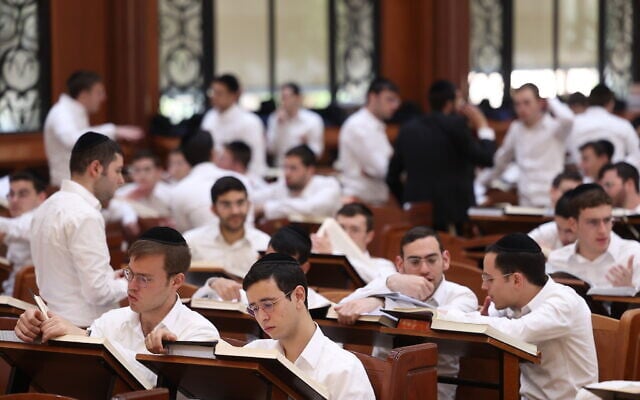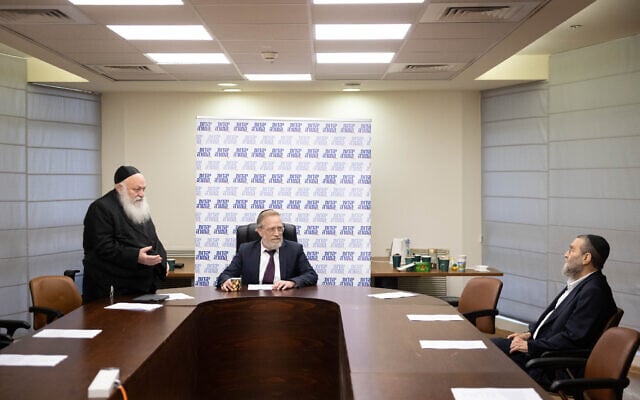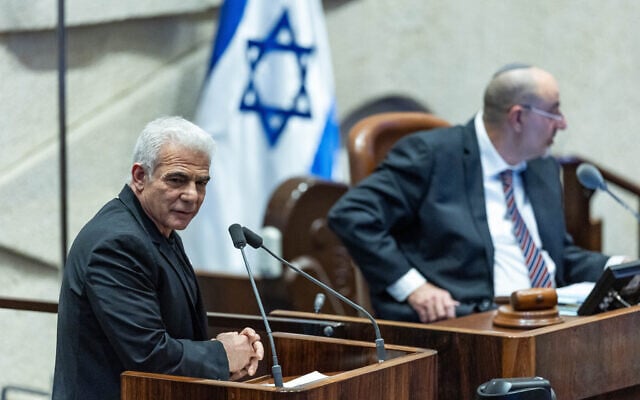After extensive negotiations, representatives from the ultra-Orthodox parties Shas and Degel HaTorah backed a reduced version of the enlistment proposal put forth by Likud member Yuli Edelstein late Wednesday night. This move prevented the early dissolution of the Knesset just as voting was about to begin.
Although the proposal was celebrated by both groups for “maintaining the current status of yeshiva students” — individuals who had been immune to conscription up until now — it represents a notably stricter approach towards draft evasion compared to prior agreements made with the ultra-Orthodox community. Nonetheless, this plan faced severe backlash from reserve soldiers and political opponents.
The former Prime Minister Naftali Bennett described the accord as a “devastating setback for reservists” claiming it would “diminish the enlistment of ultra-Orthodox individuals.” Meanwhile, Yair Golan, the head of The Democrats, criticized Edelstein, labeling him a “figurehead without real power.”
“What seems like sanctions aren’t actually sanctions at all. They’re just incentives for ultra-Orthodox young people to remain in yeshivas,” Golan stated during a press conference on Thursday afternoon.
A tussle over sanctions
The core issue during what is now considered an ended crisis revolved around the dissatisfaction of the ultra-Orthodox leaders towards Edelstein. As head of the influential Knesset Foreign Affairs and Defense Committee, he had consistently obstructed the approval of legislation aimed at legally cementing extensive exemptions from military service for Haredi individuals.
A draft version of the legislation under development by Edelstein’s committee reportedly included severe penalties such as losing eligibility for property taxes and public transit concessions, revocation of tax advantages for employed women whose husbands avoid military service, disqualification from participating in the housing lottery, and termination of daycare and educational support programs.

Nevertheless, to avoid dissolving the Knesset, Edelstein seems to have retreated from numerous requirements he initially sought.
As reported by the ultra-Orthodox Behadrei Haredim news website,
Hebrew
The revised plan states that the recruitment legislation will be a provisional measure lasting for just six years, with this period being reduced to four years should it fail to achieve its activation targets.
Although sanctions linked to grants for academic pursuits, international trips, and driver’s licenses would take effect right away, those concerning childcare benefits and public transit subsidies would be postponed.
If the government fails to meet its recruitment goals within two years, further penalties will come into play, such as barring those who dodge the draft from participating in the housing lottery.
Sanctions will be applied to yeshivas that do not meet their quota for providing soldiers. This could include reducing up to 50% of a yeshiva’s funding if they fall short of at least 95% of their yearly goal, and withholding the entire budget should they only manage below 75%.

Under the reported compromise, the status of all yeshiva students would be reset and need to be regulated from scratch, meaning that many of those who have received multiple draft orders and been declared evaders will now no longer be subject to arrest.
The new agreement seems to boost recruitment goals at a considerably slower pace compared to what Edelstein proposed.
previously demanded
, increasing to half of the yearly intake by 2030.
What benefits do the ultra-Orthodox Jews stand to gain?
Not all of the Haredim have accepted the deal, with the Hasidic Agudat Yisrael — which together with Degel Hatorah comprises the United Torah Judaism party —
rejecting the compromise
However, they still represent a minority amongst the Haredi members of parliament in the Knesset.
Asked why the ultra-Orthodox would agree to a compromise which still imposes multiple sanctions on yeshiva students, Yisroel Cohen, an ultra-Orthodox journalist with close ties to the Haredi parties, told The Times of Israel that Shas and Degel Hatorah supported a watered down version of Edelstein’s proposal “because they think there is no other choice.”
Noting that the army is preparing to begin
issuing over 50,000 additional enlistment orders
to Haredim in July, Cohen said that, if passed, the proposed law would “reset” the status of those being mobilized and allow their Knesset representatives to “buy time” to find a better solution.

From their perspective, “even a bad law” is better than no law, and Shas and Degel Hatorah “know that with another government they won’t achieve anything even close to this,” he said.
The law would similarly reinstate
Yeshivas face budget cuts following last year’s High Court decision.
That yeshiva students should be drafted has been proposed. Many rabbis would actually support this move as they believe it will prevent their pupils from leaving the country or getting sidetracked by activities unrelated to their religious education, according to Yanky Faber, a correspondent for Behadredi Haredim.
“They don’t mind these sanctions at all,” he said.
“Their biggest pressure right now is to fix the damage to the yeshiva budget and the status of yeshiva students and men studying in Kollel as lawbreakers,” agreed Dr. Gilad Malach, a researcher at the Israel Democracy Institute who studies the Haredi community.
Although the Haredim do not genuinely agree with the conditions of the Edelstein compromise, “they think that during the process of refining the specifics, they can adjust or overturn the stringent provisions,” he stated. He added that their hope is that once we overcome this conflict, ideally under a new administration, all aspects could undergo additional revisions and softenings.
Losing their leverage
When asked why the opposition chose not to take their bill to dissolve the Knesset off Wednesday’s schedule despite the Haredim stating they supported the new proposal and wouldn’t back the dissolution, a spokesperson for the Yisrael Beytenu party countered that doing so would essentially “aid their scheme” and provide them with additional time to introduce an evasive legislation instead.

Opposition Leader Yair Lapid (Yesh Atid) issued a comparable warning, informing legislators late at night that moving forward with the vote for dissolving parliament would prevent Haredi political groups from having the power to dissolve the Knesset in upcoming discussions about the legislation.
According to parliamentary procedures, since the legislation has been rejected, members of parliament must await a period of six months before they can propose another bill for dissolving the Knesset to be voted on.
After rejecting the Knesset dissolution legislation, the Haredi have considerably diminished influence compared to before, which makes it substantially harder for them to reintroduce a similar bill to the plenary within the next six months, according to Assaf Shapira, who directs the Israel Democracy Institute’s Political Reform Program. He shared this insight with The Times of Israel.

“I believe that at this point, everybody realizes they actually don’t want to go through with it. Despite all the threats and more threats, nothing transpired. As such, they’ve squandered their credibility,” he stated.
As per Shapira, the Haredim have three alternative choices left.
The initial approach involves utilizing a Knesset regulation which allows a rejected proposal to be resubmitted for review within half a year if significant changes occur. Nonetheless, this action necessitates the endorsement of Knesset Speaker Amir Ohana, thereby introducing considerable uncertainty.
The second would be to bring a “full constructive vote of no confidence, which means that 61 Knesset members must support an alternative government” that could take the current one’s place — an option which Shapira says is not particularly realistic in light of the current opposition’s demand for full ultra-Orthodox conscription.
Lastly, the Haredim could “just leave the government.”
“It would result in a minority government, but this does not imply that the administration immediately collapses,” he stated, further noting that the ultra-Orthodox had “definitely missed their final opportunity” to remove Netanyahu from power before 2026.
The reality that the Haredim lack significant influence remains unnoticed by the coalition, as evidenced by Likud lawmaker Dan Illouz’s tweet on Thursday night stating, “There isn’t presently a genuine menace to the government’s stability since it would be impossible to reintroduce legislation aimed at dissolving the Knesset unless there were an extraordinary shift in circumstances.”
“Right now, as the pressure has eased, the Likud needs to push for a draft law that embodies the national and liberal principles of our group,” Illouz insisted.
The post
Why did the ultra-Orthodox community consent to an enrollment policy that includes penalties?
appeared first on
The Times of Israel
.
Don’t overlook crucial Israel news — subscribe to the complimentary Times of Israel Daily Edition.


















Leave a Reply